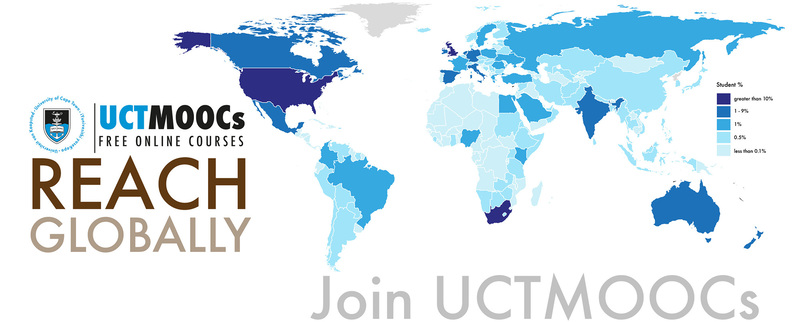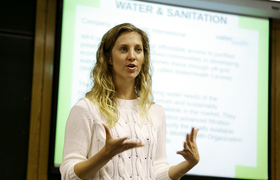UCT MOOCs make international impact
27 August 2018 | Story Supplied. Photo Supplied. Read time 4 min.
As the University of Cape Town’s (UCT) 14-strong portfolio of open online courses continues impacting internationally, six have been singled out as world class by global MOOC monitoring website Class Central, based on participants’ reviews.
Every year since the launch of the university’s first Massive Open Online Courses (MOOCs) in 2015, one or more have featured on Class Central’s annual Top 50 MOOCs of All Time list, and the newly-released 2018 list is no exception.
ʻWhat is a Mind?ʼ, presented by internationally-acclaimed neuropsychologist and psychoanalyst Professor Mark Holms, who heads UCT’s Department of Psychology, retained its five stars in the latest list, along with ʻExtinctions: Past and Presentʼ, presented by renowned palaeontologist Professor Anusuya Chinsamy-Turan (Department of Biological Sciences), and ʻUnderstanding Clinical Research: Behind the Statisticsʼ, by Dr Juan Klopper (Acute Care Surgery).
UCT joins Stanford University and the University of Pennsylvania as the only universities in the world to have three courses named in the Top 50 list this year.
UCT had a further three MOOCs included in The Definitive List of Courses for Learning About the United Nations Sustainable Development Goals (SDG).
This list is compiled with input from the SDG Academy within the UN’s Sustainable Development Solutions Network (SDSN). The SDG Academy and Class Central identified more than 100 courses on sustainable development from global universities, including Harvard, Oxford, Stanford and the Massachusetts Institute of Technology (MIT).
UN recognition
UCT’s MOOCs are tagged as offering insight into three separate Sustainable Development Goals – SDG 4: Quality Education; SDG 9: Industry, Innovation and Infrastructure; and SDG 13: Climate Action.
They are:
- ʻEducation for All: Disability, Diversity, and Inclusionʼ, from the division of Disability Studies in the Faculty of Health Sciences.
- ʻBecoming a Changemaker: Introduction to Social Innovationʼ, a collaboration between the Bertha Centre for Social Innovation and Entrepreneurship at the Graduate School of Business (GSB) and RLabs, a community-based social entrepreneurship organisation.
- ʻClimate Change Mitigation in Developing Countriesʼ, from the Energy Research Centre in the Faculty of Engineering and the Built Environment.
The university recently launched two new MOOCs aligned with the SDGs, according to Janet Small, course development manager in the Centre for Innovation in Learning and Teaching (CILT).
These include ʻLarge Marine Ecosystems: Assessment and Managementʼ, from the Marine Research Institute (aligned with SDG 14: Life Below Water), and the African Climate and Development Initiative’s ʻClimate Adaptation in Africaʼ (SDG 13: Climate Action).
Since CILTʼs 2015 launch of the first two MOOCs, ʻMedicine and the Arts: Humanising Healthcareʼ and ʻWhat is a Mind?ʼ, which are now in their fourth year on FutureLearn, more than 220 000 people from across the world have signed up for UCTʼs open online courses.
Along with the 14 funded courses which are now complete, Small said new MOOCs were being developed with support from units and projects seeking “maximum exposure and wide public reach”.
“There are several exciting new courses in development, including a specialisation on fintech, a course on research for impact which is a collaboration between the African Climate & Development Institute (ACDI) and Oxfam, and four courses on disability inclusion for teacher education,” she said.
All these open enrolment courses offer flexibility and increased access to a huge range of interesting topics.
“We’re really proud that UCT is able to contribute to the global offerings,” Small added.
 This work is licensed under a Creative Commons Attribution-NoDerivatives 4.0 International License.
This work is licensed under a Creative Commons Attribution-NoDerivatives 4.0 International License.
Please view the republishing articles page for more information.










